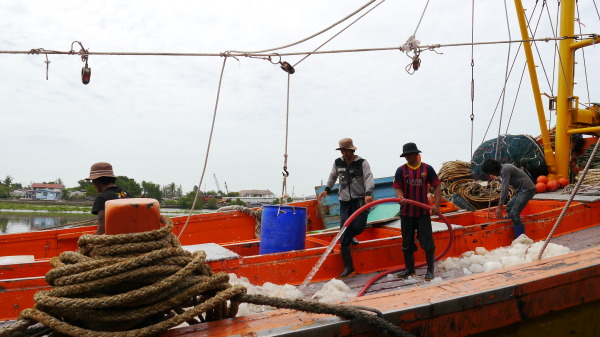Thailand, ASEAN and the Mekong subregion still do not have decent rightsbased regulations and safety nets in place to ensure justice for migrants, say nongovernmental organisations.
The question of “decent work” resonates among migrant workers on a global level and in Thailand, said Brahm Press, director of the Migrants Assistance Program (MAP) Foundation based in Chiang Mai.
“Many countries restrict the type of work migrants can do, regardless of whether or not they have skills,” he said on the sidelines of a conference in Dhaka, Bangladesh, last week. ”In many of the ‘unskilled’ jobs migrants do, they are considered disposable rather than as workers who can increase productivity through skills development.”
Migrant workers, he said, systematically received less than a living wage, forcing them to work excessive hours; even then, they may not even receive the minimum wage.
In Thailand and many other countries in Asia, migrants are stuck under an inflexible policy that requires them to remain with a single employer in a single type of job in one location in order to remain documented.
In reality, employers use their workers for multiple jobs, often in different locations. And when migrants feel cheated or abused, it is easier to just run away and become undocumented than it is to try and formally change employers, file charges and remain documented, noted Press.
“There are those migrants who will get an agent to register as their employer in order to have flexibility in their job options. On the other hand, migrant workers have been made more temporary as part of a ‘flexible workforce’ where employers have less and less direct responsibility for their workers through subcontracting,” he said.
When there are economic shocks, migrants are the first to lose their jobs, and they rarely receive unemployment benefits, said Press.
For migrants in Thailand, he said, their home countries do not yet have social protections to accommodate unemployed, incapacitated or retired migrants who return home, and their economies are not able to accommodate them either.
“Migrants are left in a precarious and uncertain position — in destination countries and back home.”
Omsin Boonlert, of the Mekong Migration Network (MMN) advocacy team, added that migrants are often treated as “temporary” in jobs that entail lengthy working hours, without knowing just how temporary their status could be.
The MMN submitted an eightpage statement at the Dhaka conference to highlight the issue of private recruitment agencies.
These agencies or brokers are mostly exploitative given the power imbalance in the relationship between workers and agencies, said Omsin.
Abuses by agencies included overcharging for passports — or charging for services not provided — offering usurious loans and debt bondage, she said.
They usually failed to fulfill responsibilities to provide appropriate training and medical checks, falsified documents on underage workers, or substituted contracts for a destination with unagreed terms, the MMN report said.
The largest movement of migrant workers within the Greater Mekong Subregion is to Thailand — from Burma, Laos and Cambodia.
“Interstate cooperation is important to improve the welfare of migrant workers. This applies not only to countries of origin and countries of destination but given that many different actors take part in international labour migration, which is multi-jurisdictional, strong cooperation between governments, employers, agencies and civil society should help reduce inconsistency of policy regulations,” said the MMN statement.
The UN special rapporteur on human rights of migrants has called for collaborative work on an ethical recruitment system. The International Labour Organization has also suggested that ASEAN members could in the future establish a regional common code of conduct for recruitment agencies.
In this regard, better data collection and sharing on recruitment practices and exploitative agencies would help minimise the problems, the MMN said.
“If necessary, governments should also work toward a policy of zero recruitment fees and reduce the role of local brokers in the recruitment process.
National governments must strongly pursue regulations and enforcement to eliminate the practice of contract substitution,” said the statement.
“All in all, strictly enact and implement the laws in line with international standards,” said Omsin.
Cambodia
As of July 2016, 132,442 Cambodians in Thailand had migrated through the formal system under a bilateral agreement, but the majority still came through informal channels.
Laos
The majority of Laos migrant workers come to Thailand by informal means on their own, with a minority — 20 percent of men and 8 percent of women — using an unlicensed broker to travel to the border. Just 25 percent of all workers use a broker in Thailand to travel from the border to a job site. As of 2013, there were 12 licensed recruitment agencies in Laos.
Burma
The Myanmar Overseas Employment Agencies Federation this year adopted a voluntary code of conduct that participating agencies will adhere to. In August this year, 129 Burmaregistered agencies signed an agreement with the government to abide by national legislation and be subject to compliance monitoring.
Vietnam
In 2013, there were more than 180 recruitment agencies licensed to send workers to Japan, South Korea, Taiwan, Malaysia and other countries. An ILO survey found that many Vietnamese workers were unhappy with their migration experience but didn’t complain. Of those who did, only 30 percent received a response.
Source: Mekong Migration Network policy brief



